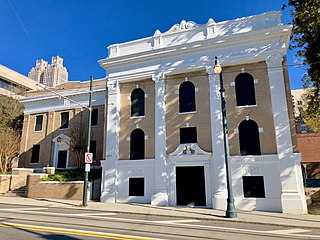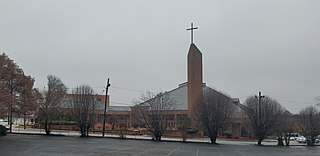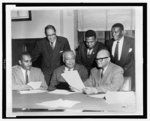Related Research Articles

Martin Luther King Sr. was an African-American Baptist pastor, missionary, and an early figure in the Civil Rights Movement. He was the father and namesake of the civil rights leader Martin Luther King Jr. He was the senior pastor of Atlanta's Ebenezer Baptist Church from 1931 to 1975.

The Martin Luther King Jr. National Historical Park covers about 35 acres (0.14 km2) and includes several sites in Atlanta, Georgia related to the life and work of civil rights leader Martin Luther King Jr. Within the park is his boyhood home, and Ebenezer Baptist Church — the church where King was baptized and both he and his father, Martin Luther King Sr., were pastors — as well as, the grave site of King, Jr., and his wife, civil rights activist Coretta Scott King.
Wyatt Tee Walker was an African-American pastor, national civil rights leader, theologian, and cultural historian. He was a chief of staff for Martin Luther King Jr., and in 1958 became an early board member of the Southern Christian Leadership Conference (SCLC). He helped found a Congress for Racial Equality (CORE) chapter in 1958. As executive director of the SCLC from 1960 to 1964, Walker helped to bring the group to national prominence. Walker sat at the feet of his mentor, BG Crawley, who was a Baptist Minister in Brooklyn, NY and New York State Judge.
James Bryant may refer to:
John H. Cross Jr. was an American pastor and Civil Rights activist. He was best known as the pastor of the 16th Street Baptist Church, an African American Baptist congregation in Birmingham, Alabama, at the time of church's racially motivated bombing in 1963. The bombing, which ripped through the church and killed four young girls, became a rallying cry for the Civil Rights Movement and propelled the problems of racial segregation in The South into the national spotlight. Cross spent much of the rest of his life working for racial reconciliation in the South.
Religion in Atlanta, while historically centered on Protestant Christianity, now involves many faiths as a result of the city and metro area's increasingly international population. While Protestant Christianity still maintains a strong presence in the city, in recent decades Catholic Christians have gained a strong foothold due to migration patterns. Atlanta also has a considerable number of ethnic Christian congregations, such as Korean Baptist, Methodist, and Presbyterian Churches, the Tamil Church Atlanta, Telugu Church, Hindi Church, Malayalam Church, Ethiopian, Chinese, and many more traditional ethnic religious groups. Large non-Christian faiths are present in the form of Buddhism, Judaism and Hinduism. Overall, there are over 1,000 places of worship within Atlanta.

Wellstar Atlanta Medical Center was a hospital in Atlanta, Georgia operated by Wellstar Health System. It had 460 beds and over 700 physicians. The hospital was a Level I Trauma Center, and an Advanced Primary Stroke Center. It housed a Neurointensive Care Unit and a Level III Neonatal ICU.
Jamal Harrison Bryant is an American minister, author and former political candidate. He is the senior pastor of New Birth Missionary Baptist Church.

The Atlanta Life Financial Group was founded by Alonzo Herndon in Atlanta, Georgia. Born into slavery, he started in Atlanta as a young barber, eventually owning three shops. He became Atlanta's richest African American and a highly successful businessman. For many years, the life insurance company was one of the most prominent African-American businesses in the United States. The demolished public housing project Herndon Homes was named for Herndon.

English Avenue and Vine City are two adjacent and closely linked neighborhoods of Atlanta, Georgia. Together the neighborhoods make up neighborhood planning unit L. The two neighborhoods are frequently cited together in reference to shared problems and to shared redevelopment schemes and revitalization plans.
Joyland is a neighborhood of small, single family homes in southeast Atlanta, Georgia and site of a former 1921 amusement park built for African Americans.
Cameron M. Alexander was an American Baptist minister. He was the leader of the 12,000-member Antioch Baptist Church North and community leader in the English Avenue neighborhood in Atlanta.

Antioch Baptist Church North is a Baptist megachurch in Atlanta, Georgia. It is affiliated with the National Baptist Convention, USA.

Wheat Street Baptist Church is a historic black Baptist church located in the Sweet Auburn neighborhood of Atlanta, Georgia. Founded in 1869, the current building was constructed in 1921 and is located adjacent to the Martin Luther King Jr. National Historical Park. The church is notable for the role it played in the Civil Rights Movement, especially under the leadership of William Holmes Borders, who served as pastor of the church from 1937 to 1988.

William Holmes Borders Sr. was an American civil rights activist and leader and pastor of Wheat Street Baptist Church in Atlanta, Georgia from 1937 to 1988.

The Church at Ponce & Highland is a Baptist church, founded in July 1914 and located at 1085 Ponce de Leon Ave NE at the corner of Highland Avenue in the Poncey–Highland neighborhood in the city of Atlanta. Designed by architect Edward Emmett Dougherty, the Beaux-Arts Style building is remarkable for its massive columns and the orb-shaped designs woodwork surrounding the baptistery.

The Twelfth Baptist Church is a historic church in the Roxbury neighborhood of Boston, Massachusetts. Established in 1840, it is the oldest direct descendant of the First Independent Baptist Church in Beacon Hill. Notable members have included abolitionists such as Lewis Hayden and Rev. Leonard Grimes, the historian George Washington Williams, the artist Edward Mitchell Bannister, abolitionist and entrepreneur Christiana Carteaux, pioneering educator Wilhelmina Crosson, and civil rights movement leader Dr. Martin Luther King Jr.
Reverend Romulus Moore was a politician and leader of the early civil rights movement after the American Civil War during the Reconstruction Era in the U.S. state of Georgia. An African American, Moore was elected to the state legislature in 1868. Moore was expelled from the legislature in 1868 along with other African Americans and reinstated in the Georgia General Assembly in 1870 by an Act of Congress. Reverend Moore was active in advocating the 15th Amendment to the United States Constitution.

The First Universalist Church of Atlanta, organized in 1895, re-established a Universalist presence in Atlanta, Georgia. Initial missionary efforts in 1879 were short-lived and failed to establish a permanent presence in the city. With the explicit assistance the Young People's Christian Union, this second missionary effort enabled the Universalists to sustain their presence and construct a church building on East Harris in 1900. The Universalists occupied the church until 1918 when they merged with Atlanta's Unitarians.
